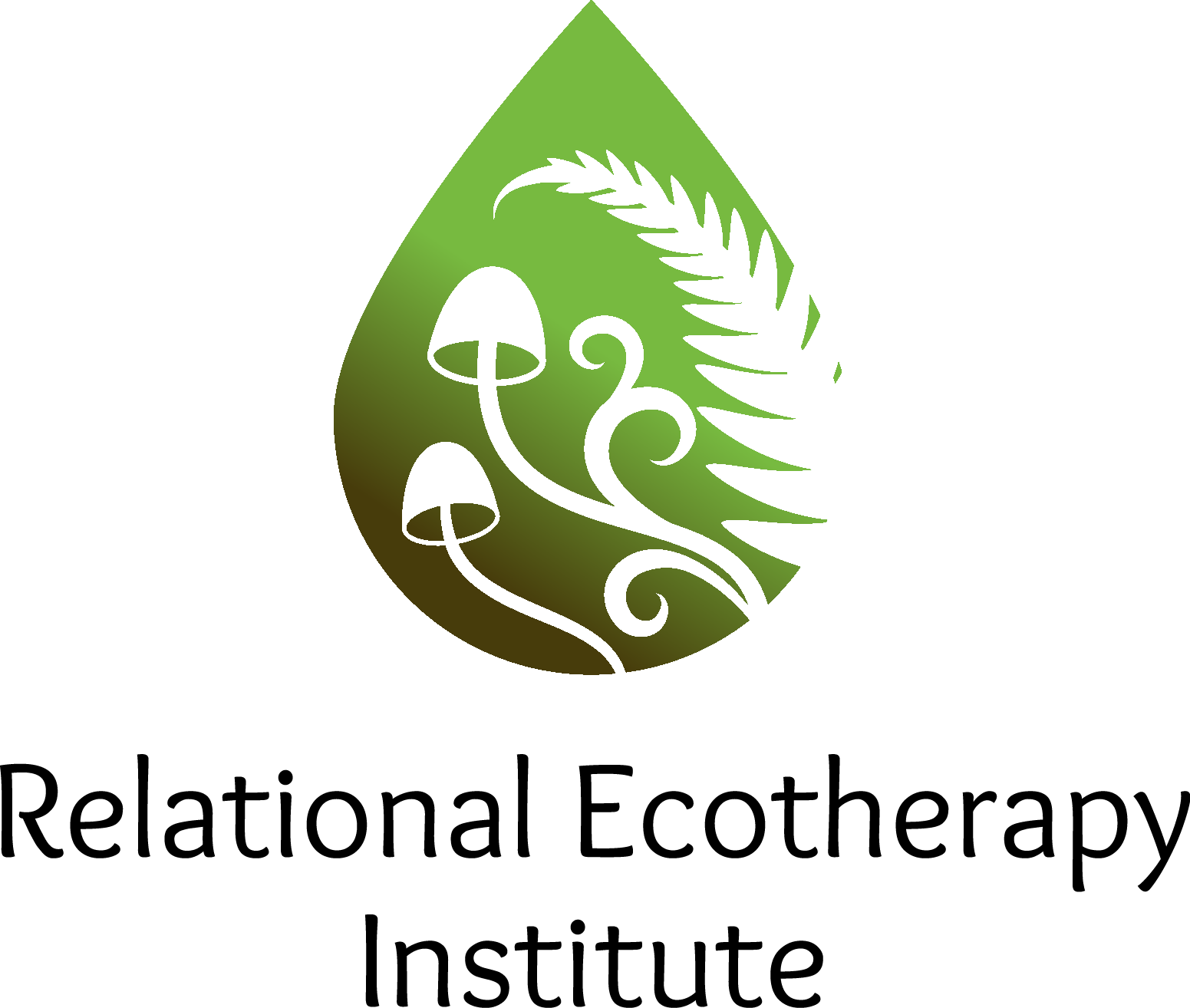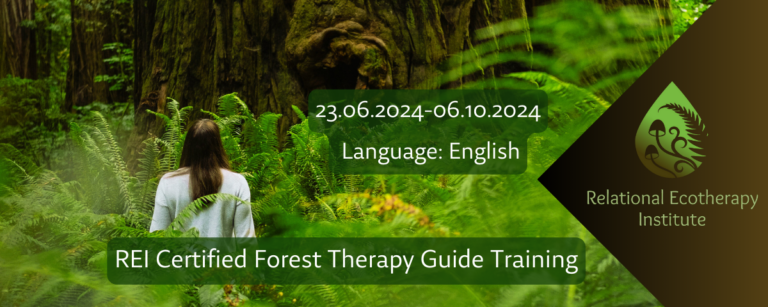
This is a professional training program in a multimodal format (in-person, field-based, online, through mentoring, with individual work) concluded with an examination and the issuance of a certificate confirming the possession of practical and theoretical specialist skills necessary for practicing a particular profession.
For whom: The course is intended for individuals with at least secondary education who wish to acquire the competencies of a forest therapy guide (forest therapist) and forest bathing. It is often chosen by healthcare professionals (doctors, psychologists, psychotherapists, occupational therapists), environmental educators, teachers, social workers, employees of care facilities, activists, tour guides, foresters, entrepreneurs offering tourist and agritourism services, coaches, NGO workers, as well as nature enthusiasts and enthusiasts.
-
Session 1 (Forest Bathing, Forest Medicine): 7 days in the Białowieża Forest (from Sunday to Saturday, for the English-speaking group, June 23 – 29- th, 2024). During this period, participants will have the opportunity to engage in both theoretical and practical activities in the field and indoors.
-
Session 2 (Forest Therapy – Advanced Part): 4 days in a forest (from Thursday to Sunday, for the English-speaking group, October 3 – 6-th, 2024). Location- Suwałki, Folwark Hutta, Poland. In addition to the activities during this session, participants will undergo an examination necessary for obtaining the certificate, consisting of both a written and practical component.
Between the sessions, there will be:
- Online lectures
- Online group activities
- Independent theoretical and fieldwork
- Remote mentorship
The education is conducted in five modes:
- In-person theoretical classes
- Field practical sessions
- Online theoretical classes
- Online workshops with a mentor
- Independent work.
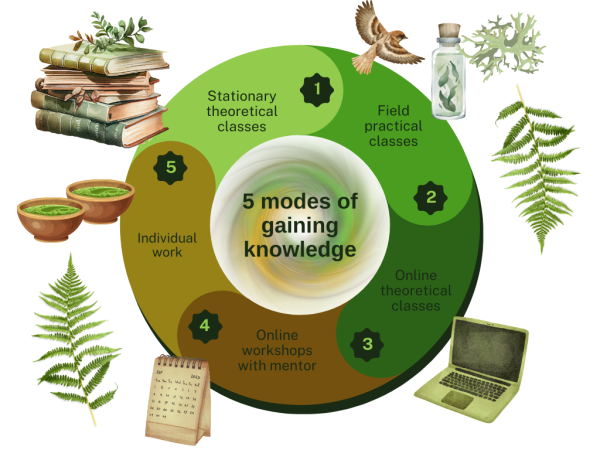
During the course, you will learn:
- How the forest influences mental, physical, social, and spiritual health.
- What forest baths, forest therapy, and ecotherapy based on the forest environment entail.
- How to design a therapeutic forest walk and forest bath, including determining suitable trails and selecting appropriate activities.
- How to work with different client groups.
- The challenges faced by a forest therapy guide and how to overcome them.
- The ecology of the forest, understanding the dependencies and relationships within the forest environment.
- How forest therapy connects with aromatherapy, herbal therapy, breathing techniques, mindfulness in nature, and therapeutic ornithology.
- What forest therapy looks like in other countries and on other continents – through international cooperation with countries such as South Korea, Japan, Finland, the Czech Republic, Belgium, and Lithuania, we have first-hand information.
- How to establish and run your own business, including marketing and establishing a presence on social media.
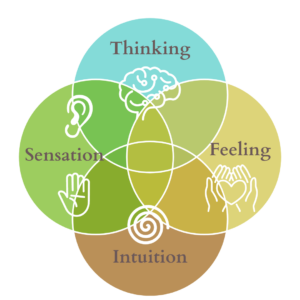
The IER Forest Therapy Course provides:
- Access to knowledge from experts, leading specialists, and practitioners in the country.
- Assessment and improvement of skills through individual work with a mentor.
- Exchange of experiences in both larger and smaller groups.
- Membership in an active community of forest bath guides and forest therapy guides.
- Rich field experiences with a group under the guidance of specialists.
- The opportunity to obtain an additional nationally recognized certificate in providing first aid (CPR) in outdoor conditions.
- Training in psychological first aid and acquiring knowledge of the basics of group processes.
- Engagement in scientific research, practical exercises, personal experiences in building relationships with nature, and visits to ecologically unique locations.
Upon completion of the course, participants will be able to:
- Lead forest baths and forest therapy sessions.
- Design ecotherapeutic activities in a forest environment for various client groups.
- Conduct ecotherapeutic sessions with elements of the forest environment indoors, such as in occupational therapy.
- Identify areas and trails suitable for forest therapy.
- Join the nationwide network of forest bath guides and forest therapy guides, fostering integration and ongoing education.
- Navigate through a vast pool of scientific research.
- Validate their knowledge and competencies by obtaining the IER certificate.
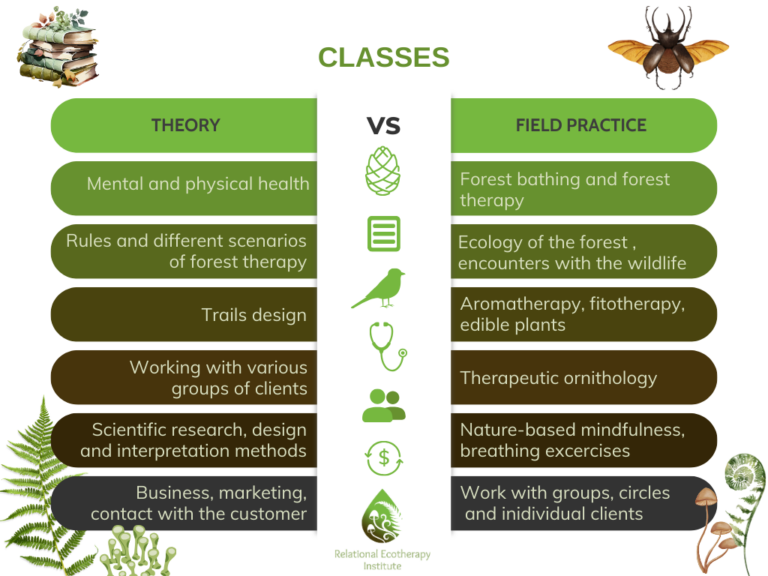
Location: Białowieża Forest – Session 1, – Session 2 – in preparation
Duration: Approximately 4 months
Price: 1500 Euro per person. The price does not include meals, accommodation, or transportation costs. We issue VAT invoices, but this must be communicated in the registration. After issuing the receipt on the day of the deposit payment, changes will not be possible.
Accommodation and 2 or 3 meals per day at the course location are possible after making an additional reservation and payment.
Completion: To complete the course, attendance at both sessions, successful completion of the required work with a mentor, passing the theoretical and practical exams are necessary.
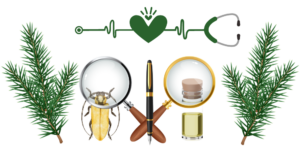
Training details:
Training Structure:
- 5 modes of work (in-person theoretical classes, field practical sessions, online theoretical classes, mentorship, independent work)
- 15 thematic modules
- Conclusion with both theoretical and practical exams
- Certification as a Forest Bath Guide from IER plus a nationally recognized certificate in wilderness first aid
- 2 field sessions: 7-day (50 hours of activities) and 4-day (23 hours of activities), totaling 11 days in the field (73 clock hours of in-person activities)
- 8 online lectures: sessions lasting 1.5 clock hours each (totaling 9 hours of online lectures)
- 6 hours of online mentorship
- 88 clock hours (117 instructional hours) of organized activities
- Approximately 45 clock hours of independent work
- A total of 133 clock hours of learning!
- Only 1 training edition in 2024
- Opportunity to receive a recommendation for joining the Polish Forest Bathing Society – the largest non-governmental organization in Poland bringing together forest bath guides and therapists, enabling further professional development and collaboration at national and international levels
- Practical learning of leading forest baths and other forest therapy activities (forest therapy)
Qualification:
- Secondary education (completed high school or technical school)
- Completion of the qualification form
- Acceptance by IER after submitting the qualification form, confirmed by receiving a response email acknowledging acceptance to the training
- Course fee payment
Certificate: The certificate will include information about obtaining the title of Forest Bath Guide and Forest Therapy Guide from IER.
Schedule:
Session 1: “Forest Bathing, Forest Medicine” in Białowieża Forest
Sunday:
- We start promptly at 10:30!
- 10:30 – 12:00 Introduction and integration
- 12:00-12:30 Snack break
- 12:30 – 15:30 Field activities: forest bathing in the IER model
- 15:30 – 17:00 Lunch break
- 17:00 – 19:00 theoretical classes
Monday:
- 9:00 – 13:15 Theoretical classes with a 15-minute break
- 13:15 – 15:00 Lunch break
- 15:00 – 18:00 Field sessions – Forest therapy in Japanese and Korean approaches
Tuesday:
- 9:00 – 12:00 Field sessions – Forest bath and forest therapy in a park or garden
- 12:00 – 14:00 Lunch break
- 14:00 – 18:15 Theoretical classes with a 15-minute break
Wednesday:
- 9:00 – 11:00 Field sessions – Forest ecology, wildlife in the forest
- Break for packed snacks (it’s recommended to bring something)
- 12:00 – 13:00 Field sessions – Breathing techniques and mindfulness in nature
- 13:00 – 15:00 Lunch break
- 15:00 -1 8:15 Theoretical classes with a 15-minute break
Thursday:
- 8:00 – 13:45 Theoretical classes with a 15-minute break – Basics of group processes and psychological first aid with psychotherapist and psychiatrist
- 13:45 – 15:00 Lunch break (shorter)
- 15:00 – 17:00 Field sessions – Local edible and medicinal plants with herbalist and fitotherapist
- After the sessions, time to develop a plan and explore the area before Saturday’s forest bath led by participants.
Friday:
- 9:00 – 18:00 Wilderness first aid, basics of CPR first aid professional- training concludes with a separate certificate, shorter lunch break in the meantime.
Saturday:
- 8:30 – 12:45 Field sessions: Forest bath led by participants under the guidance of a trainer and discussion
- 13:00 – 15:00 Theoretical classes
- 15:00 – 16:30 Lunch break (shorter)
- 16:30 – 18:00 Theoretical classes
- 18:00 Conclusion of the first session
Mentorship with the mentor:
- Individual and group meetings online between sessions to discuss and analyze the conducted forest therapeutic activities and homework.
Independent work:
- Independent conduct of forest baths and forest therapy (later discussed in mentorship), theoretical issues, knowledge of the terrain and natural surroundings, relationships and processes in nature in one’s own environment, preparation of reports on conducted activities and observations.
Online live lectures:
- Impact of the forest environment on physical health based on a review of scientific research. Lifestyle diseases. Stress pathophysiology. 90 min, Katarzyna Simonienko
- Impact of the forest environment on mental health based on a review of scientific research. Basics of psychopathology. Defense mechanisms. ART and biophilia theory. Impact of the forest environment on children’s development. 90 min, Katarzyna Simonienko
- Principles of forest accessibility from a forester’s perspective. 45 min, by a forester
- Designation of places and trails for forest therapy and forest baths, the use of landscape architecture in forest therapy. 45 min, by a forester
- Technology and forest therapy: VR, AI, “online forest baths” – pitfalls, perspectives, research, and justification. 45 min
- Forest therapy and business: office, running a business, social media, advertising, marketing. 90 min
- Scientific publications – understanding, searching, interpreting, and the value of scientific research. 45 min.
- Collaboration of forest therapy guides with various institutions (healthcare and educational facilities, environmental organizations, NGOs, foundations, State Forests, tourist centers) and interdisciplinary work. 90 min.
Session 2: “Forest Therapy – Advanced Part” , October 3 (Thursday) – October 6 (Sunday) 2024
Thursday:
-
Start promptly at 12:00!
- 12:00 – 14:15 Theoretical classes with a 15-minute break
- 14:15 – 15:30 Lunch break
- 15:30 – 17:30 Theoretical classes in a workshop format
Friday:
- 9:00 – 10:00 Theoretical classes – Therapeutic ornithology with Dr. hab. Sławomir Murawiec
- 10:00 – 12:00 Field sessions – Therapeutic ornithology with Dr. hab. Sławomir Murawiec
- 12:00 – 14:00 Lunch break
- 14:00 – 16:00 Theoretical classes
- 16:30 – 18:00 Theoretical classes – Neurobiology of the brain in the context of being/absence in nature –
Saturday:
- 9:00 – 10:00 Theoretical exam (test)
- 12:00 – 15:00 Practical exam (forest therapy in the field)
- 15:00 – 17:00 Lunch break
- 17:00 – 19:00 Practical sessions – Aromatherapy with professional aromatherapist
- 19:30 Gala dinner! 🙂
Sunday:
- 9:00 – 12:00 Practical sessions – Working in the field with an individual client and discussion
- 12:30 – 14:00 Theoretical classes
- 14:15 – 15:45 Training summary, certificates and gifts, course closure, commemorative photos.
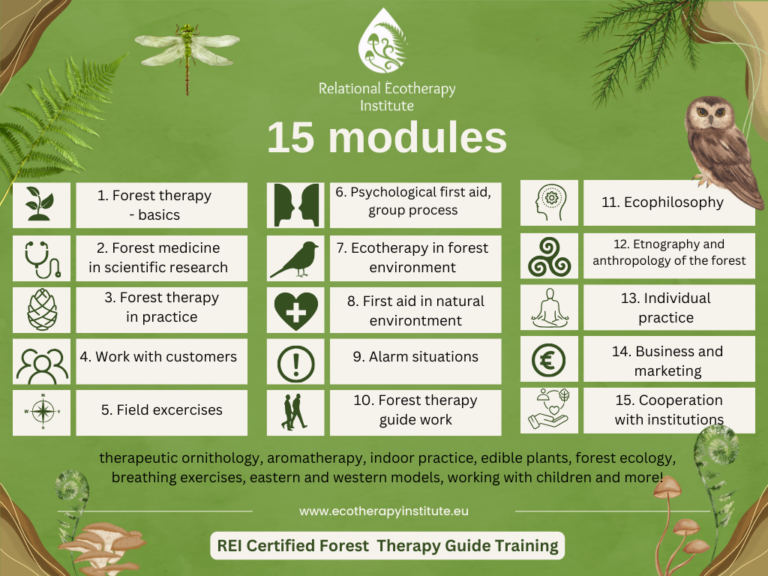
Module 1. Forest Therapy – Fundamentals: forest baths, forest therapy, forest medicine, sylvotherapy, ecotherapy. Concepts, basic principles and rules, history, development, current situation in the country and worldwide, the tradition of forest healing versus the latest scientific research, the role and application of forest therapy and forest baths.
Module 2. Forest Medicine in Scientific Research: a review of scientific research from the country and around the world, from Japanese beginnings to the latest publications. Searching, understanding, and evaluating the value of research. Designing scientific research. Interdisciplinary collaboration in research projects. Ways and mechanisms of the forest environment’s impact on physical and mental health. Biochemistry of forest air. Theories: ART, biophilia, the One Health approach. Pathophysiology of stress. Basics of psychopathology. Basics of the neurobiology of the human brain in the context of the relationship with the natural environment. The impact of the natural environment on children’s health.
Module 3. Forest Therapy in Practice: basics of conducting forest baths and forest therapy, preparation for sessions, the structure of the IER walk, sequences of therapeutic forest walks, relaxation and breathing exercises, and various activities incorporated into forest therapy, working with the senses, sharing circles, forest invitations, the role of integrating the process, starting and ending thresholds, forest tea, gadgets, hammocks, forest therapy: national and international approaches (Korea, Japan, Taiwan, Scandinavia, USA, Europe). Working in different terrain conditions. Preparation for forest therapy. What to pack. Indoor forest bath sessions. Technology and forest therapy.
Module 4. Working with Clients: types of clients (individual clients, couples, families), different audience groups (age groups: children, youth, adults, seniors), business groups, groups with health limitations, group character – understanding the client’s needs and specifics. Assistance of specialized personnel during forest therapy. Forest therapy scenarios for different groups. Qualifying clients for forest therapy (acceptances and refusals). Group interactions, how to manage a group, group dynamics, emotional safety of the group, holding the circle, creating a safe space. Guide competencies in different group situations.
Module 5. Field Actions: how to choose a trail, principles of work in different types of terrain, legal regulations, principles of forest access, state and private forests, forest therapy in gardens and parks, the forest at night, risky situations: difficult weather conditions, encounters with wild animals, poisonous and edible plants, forest ecology, understanding natural processes in the forest ecosystem, occupational health and safety rules when working with a group in the field. Designing trails and locations for forest therapy and forest baths.
Module 6. Psychological First Aid. Basics of group processes.
Module 7. Ecotherapy in the Forest Environment (nature-based interventions): therapeutic ornithology, edible plants, basics of phytotherapy, basics of aromatherapy, breathing techniques, art therapy in nature, play therapy, adventure therapy, elements of occupational therapy, storytelling, bodywork training (Jacobson, Schultz), mindfulness in nature, yoga, music therapy – when, how, why?
Module 8. First Aid in the Natural Environment. Basics of cardiopulmonary resuscitation.
Module 9. Emergency and Difficult Situations in Forest Therapy Practice: how to recognize them, prevent them, and cope with them.
Module 10. Forest Therapy Guide: working in partnership with Nature, Nature as a co-therapist, competencies of a forest therapy guide and the limits of these competencies, collaboration with other guides, ecotherapists, and specialists (health, education, tourism) – when, how, what to pay attention to. Ethics of work. Characteristics of a good guide. Guided walks vs independent forest bathing practice. Occupational health and safety for guides and participants.
Module 11. Eco-philosophy: ecopsychology, deep ecology philosophy, Joanna Macy and the Work That Reconnects, ecolinguistics, and the role of narration, attitude towards indigenous communities and cultural heritage, social and spiritual health.
Module 12. Ethnography and Anthropology of the Forest: customs and beliefs related to the forest environment in the Polish and European cultural circles, regional stories, the forest and its elements in mythologies, legends, fairy tales, in symbolic and metaphorical meanings. Archetypality of the forest environment.
Module 13. Independent Practice in Relation to Nature and the Forest Environment – how to nurture personal relationships with Nature.
Module 14. Business and Marketing: running a business, advertising, social media, GDPR, informed consents, forms of signing up for sessions, clauses, forms, customer contact.
Module 15. Collaboration of Forest Therapy Guides with Various Institutions: health and education centers, schools, tourist facilities, non-governmental organizations, ecological organizations, owners of forest areas, State Forests, government offices.
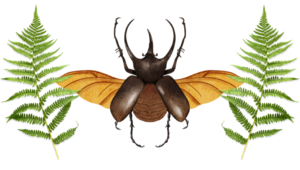
The Team
Scientific supervision: dr. Katarzyna Simonienko, MD, PhD, psychiatrist, forest therapist, ecotherapist, scientist
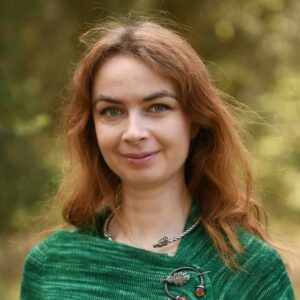
Trainers and Mentors:
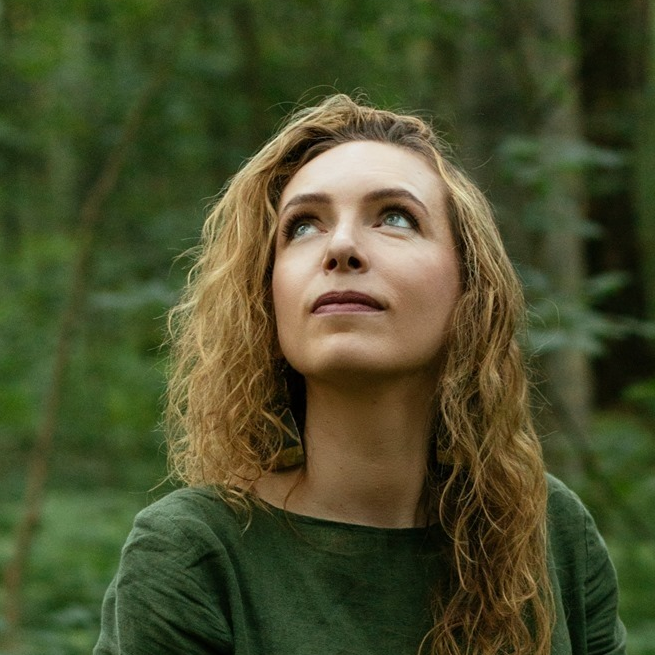
Mila Monk (Lithuania)- forest bathing guide, ecolinguist, language interpreter, story-teller

Joanna Ciepielewska (Poland)- forest bathing guide, soft skills trainer, coach, nature activist
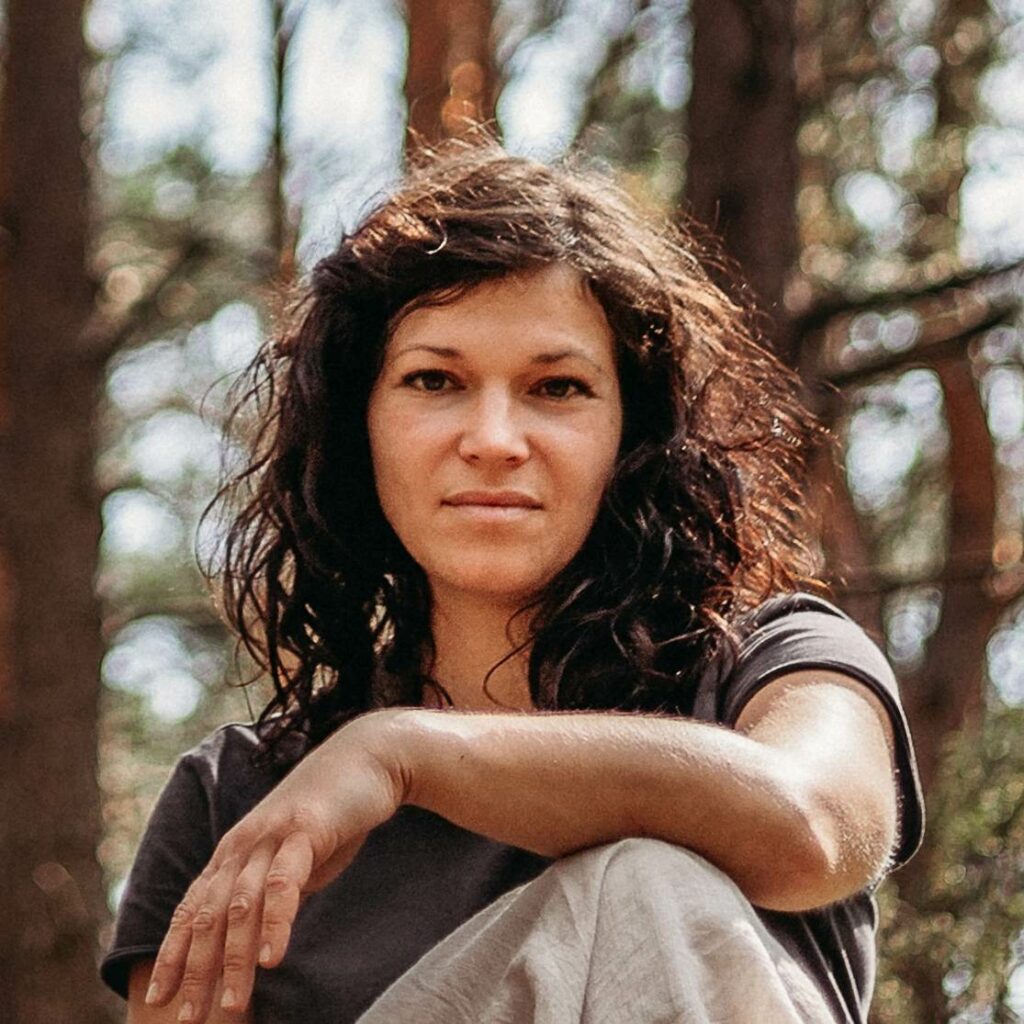
Marta Cichowska-Napiórkowska (Poland) – forest bathing guide, Buteyko Breathing Technique trainer, hortitherapist
Experts and Lecturers:

Sławomir Murawiec, MD. PhD, dr habilit.- psychiatrist, psychotherapist, scientist, therapeuthic ornithology specialist
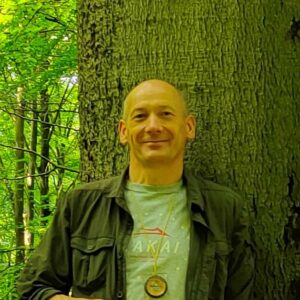
Prof. Bogdan Jaroszewicz – biologist, botanist, entomologist, scientist, forest ecology specialist, deputy general directorate of National Forests in Poland

Dr Joanna Podgórska– neurobiologist, scientist, book anuthor, podcaster, science popularizer
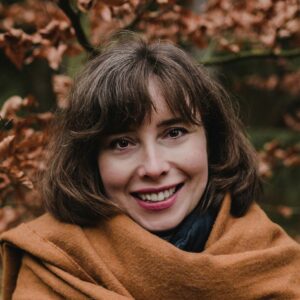
Maria Rothert-Proniewicz– forester, specialist in landscape architecture, forest bathing guide
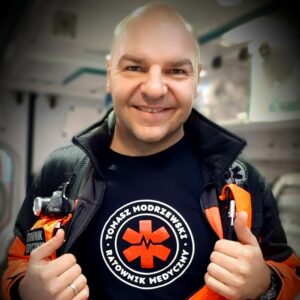
Tomasz Modrzewski– first aid specialist, paramedic, head of the Emergency Medical Team, practitioner, pharmacist
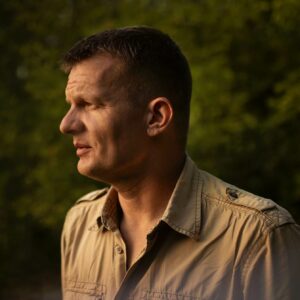
Bartek Guentzel– survival and bushcraft specialist
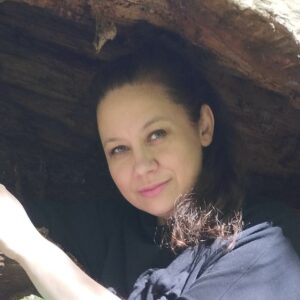
Monika Gendek– psychologist, Gestalt therapy psychotherapist, ecopsychotherapist
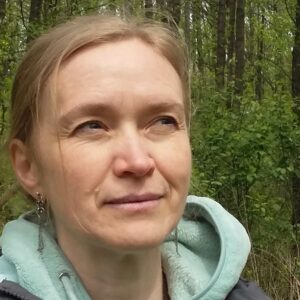
Katarzyna Rutkowska– fitotherapist, herbalist
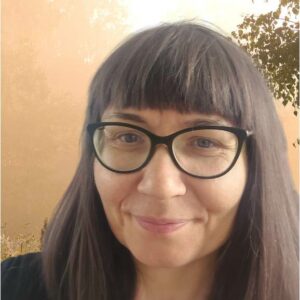
Paula Waluk-Stubbe – aromatherapist, fitotherapist, herbalist
Accomodation and meals:
Accommodation and meals are not included in the course fee, but we assist in organizing them during the first meeting in the Białowieża Forest area.
The first on-site meeting will take place at the address: “Sioło Budy,” Budy 41, 17-230 Budy (next to Białowieża). Accommodation with meals is available in shared rooms at this location. The facility offers vegetarian meals in several options (breakfast and dinner or breakfast, lunch, and dinner, possibly only breakfast).
If you are interested in taking advantage of this offer, please contact our office via email at office@ecotherapyinstitute.eu. We will help with the reservation.
- Price per person for accommodation with breakfast in double and triple rooms is 140 PLN/person.
- Price per person for accommodation with breakfast, lunch, and dinner is 215 PLN/person.
- Price per person for accommodation with breakfast, lunch, and dinner is 260 PLN/person.
The second meeting will take place in a different place. Details will be provided soon.
Location of the first meeting place (Sioło Budy):”
The second field meeting will be held at the following address: Folwark Hutta, Huta 7, 16-402 Suwałki. Link to the website: https://www.hutta.pl/. Contact: +48 515 269 875, biuro@hutta.pl. It is also possible to provide accommodation and meals in single or double rooms. The center offers vegetarian meals (breakfast, lunch and dinner). We start with lunch on Thursday, October 3 and end with lunch on Sunday, October 6 Accommodation with breakfast in a double room PLN 140 / person /day Accommodation with breakfast in a double room, dinner PLN 180 zł / person /day Accommodation with breakfast in a double room, lunch, dinner PLN 260 zł / person /day Accommodation with breakfast in a single room PLN 230 / person / day Accommodation with breakfast in a single room, dinner PLN 270zł / person /day Accommodation with breakfast in a single room, lunch, dinner PLN 350 zł / person /day
Payment and reservation:
Fee: The fee for the training is 1500 Euro per person
Both the deposit and the remaining amount should be paid only after receiving acceptance via email following the submission of the completed qualification form.
Training Fee:
- includes: field, stationary, and online classes, mentor support during individual work, online group sessions, and individual online meetings with the mentor, trainer support during meetings, comprehensive 8-hour certification training in wilderness first aid, training in basic psychological first aid and group processes, aromatherapy materials (essential oils, accessories) during practical aromatherapy sessions, gifts, selected educational materials, a ceremonial dinner at the end of the training, certificates in both paper and digital format (PDF).
- does not include: accommodation and meals (additional reservations at the location of the first meeting can be made through our office)
The order of reservation is determined by the order of non-refundable deposit payments of 150 Euro. Details regarding payments can be found in the registration form. Those requiring an invoice are asked to indicate this in the form in advance. After making the payment, changing from a receipt to an invoice will not be possible.
Payment in installments is possible.
Exams and Certification:
The exam will consist of a theoretical part in the form of a multiple-choice test and a practical part involving guiding a randomly selected segment of a forest therapy walk in the IER model. Both parts will take place during the September meeting.
You will receive a list of readings, selected educational materials, and the scope of knowledge necessary to pass the exam at the end of the first meeting.
Conditions for certification:
- successfully passing the theoretical and practical exam
- presence at both stationary meetings
- attendance at live online lectures or passing the content of online lectures in case of absence
- passing individual work under the supervision of a mentor
- obtaining a first aid certificate in the field during the first descent
- acceptance of the IER code of ethics
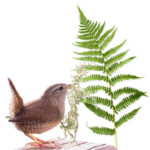
Before submitting the form, please familiarize yourself with the REI Code of Ethics and Privacy Policy.
